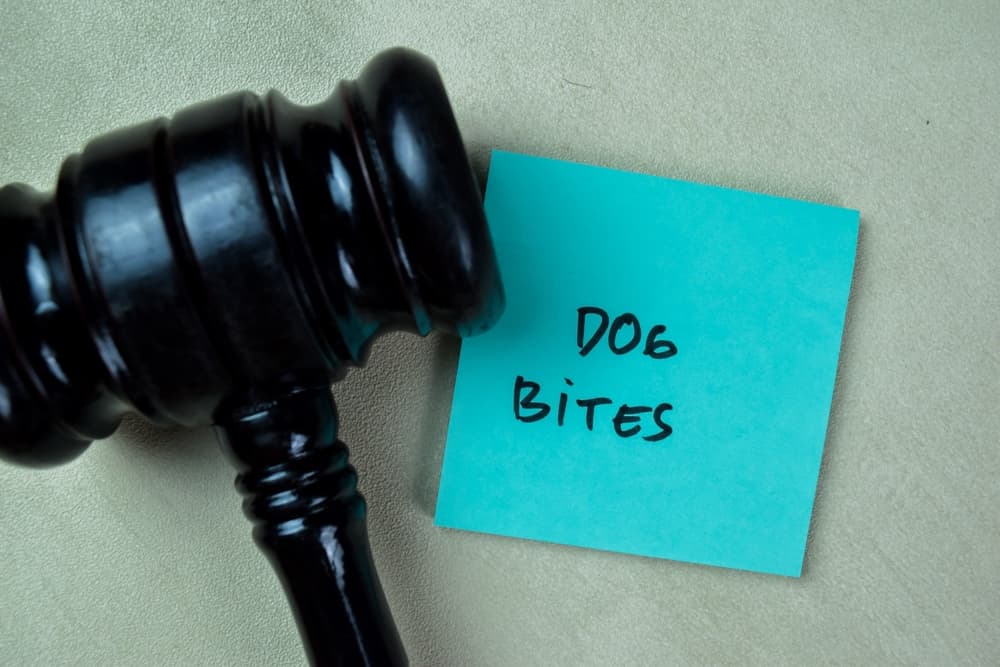Dog bites can be painful, frightening, and emotionally traumatic experiences. They can also result in significant physical injuries, scarring, and even long-term disabilities. If a dog has bitten you or a loved one, you may be wondering whether you are entitled to compensation for your injuries and other losses. The best way to know is to consult a dog bite lawyer in your area immediately.
Dog Owner Liability: When is a Dog Owner Responsible for a Bite?

In most states, dog owners are subject to a legal principle known as "strict liability" regarding dog bites. This means that a dog owner can be held financially responsible for injuries caused by their dog, even if the owner had no prior knowledge that the dog was dangerous or had never bitten anyone.
Under strict liability, a dog bite victim typically needs to prove that:
- The defendant owned the dog that bit the victim
- The dog bit the victim
- The victim was either in a public place or lawfully on private property when the bite occurred
If these elements are present, the dog owner can face liability for the victim's injuries and other losses, regardless of the owner's negligence in handling or restraining the dog.
However, there are some exceptions to strict liability that may apply in certain cases, such as:
Provocation
Provocation is one of the most common defenses that dog owners may raise in response to a dog bite claim. If the dog owner can show that the victim provoked the dog into biting, they may not be liable for the resulting injuries, even if they will otherwise be subject to strict liability.
Provocation can manifest in various ways but typically includes any act or behavior by the victim that can reasonably provoke the dog to respond aggressively or defensively.
Examples of provocation may include:
- Teasing or taunting the dog
- Hitting, kicking, or otherwise physically harming the dog
- Threatening the dog or its owner
- Entering the dog's territory (e.g., a fenced yard or home) without permission
- Interfering with the dog while it is eating, sleeping, or caring for puppies
If the dog owner can present evidence that the victim engaged in provocative behavior, they can avoid liability for the resulting injuries. However, the provocation defense may not apply in all cases, particularly if the victim was a young child who may not have understood the consequences of their actions.
Even if someone provokes the dog, the owner may still face liability if they knew or should have known about the dog's dangerous tendencies and did not take reasonable steps to prevent the bite.
Trespassing
Trespassing is another common defense that dog owners may raise in response to a dog bite claim. Suppose the victim was trespassing on private property when the bite occurred. In that case, the owner may not be liable for the resulting injuries, even if they are otherwise subject to strict liability.
Trespassing occurs when someone enters another person's property without permission or legal authority. In the context of dog bites, trespassing can include situations where the victim:
- Entering a fenced yard or another enclosed space where a dog resides can provoke the animal
- Enters the dog owner's home or other building without permission
- Ignores "No Trespassing" or "Beware of Dog" signs posted on the property
If the dog owner can show that the victim was trespassing at the time of the bite, they can avoid liability for the resulting injuries. However, there are some important exceptions to this defense, particularly when the victim is a child. Even if a child was technically trespassing at the time of a bite, the dog owner may still be liable if they knew or should have known about the dog's dangerous propensities and failed to take reasonable steps to prevent the bite from occurring.
These situations can be complicated, so always have a dog bite lawyer assess how defenses might apply or be challenged in your case.
Assumption of Risk
Assumption of risk is a defense that may apply in dog bite cases involving certain professions or activities involving regular contact with dogs. Under this defense, if the victim was engaged in an activity involving a known risk of being bitten, they may have assumed that risk. They cannot recover damages from the dog owner.
Examples of professions or activities that may involve an assumption of risk when it comes to dog bites include:
- Veterinarians and veterinary technicians
- Dog groomers and trainers
- Animal control officers and shelter workers
- Dog sitters and walkers
- Participants in dog sports or shows
The victim may voluntarily accept the risk of being bitten due to their profession or activity. As a result, they cannot recover damages from the dog owner, even if the owner will otherwise be subject to strict liability.
However, the assumption of risk defense may not apply in all cases, especially if the dog owner did not disclose the dog's known dangerous propensities or if the owner's negligence, rather than the inherent risks of the profession or activity, caused the victim's injuries.
Even if the assumption of risk applies, the victim may still be entitled to workers' compensation benefits if the bite occurred during the victim's employment.
Ultimately, whether provocation, trespassing, or assumption of risk applies in a particular dog bite case will depend on the specific facts and circumstances of the incident. An experienced dog bite attorney can evaluate the strength of these defenses and determine how to challenge them. They can advise victims on their legal rights and options for pursuing compensation.
The laws and exceptions surrounding dog owner liability can vary from state to state, so it's best to consult an experienced dog bite lawyer to evaluate your case and advise you on your legal rights and options.
Negligence: When is a Dog Owner Negligent?
A dog owner may also be liable for a dog bite under a negligence theory, even if strict liability does not apply. Negligence occurs when a dog owner fails to take reasonable steps to prevent their dog from biting or injuring someone or harming the victim.
Examples of negligence by a dog owner may include:
- Failing to properly train or socialize the dog
- Failing to restrain the dog with a leash, fence, or other barrier
- Allowing the dog to roam freely in public places
- Failing to warn others about the dog's dangerous propensities, if known
- Failing to supervise the dog around children or other vulnerable individuals
To prove negligence in a dog bite case, the victim typically needs to show that:
- The defendant owned or controlled the dog
- The defendant had a duty to take reasonable steps to prevent the dog from harming others
- The defendant breached that duty by failing to take reasonable precautions
- The defendant's breach of duty caused the victim's injuries
If these conditions are satisfied, the dog owner becomes liable for the victim's injuries and other losses, even if the dog has no history of aggression or is unaware of any dangerous tendencies.
Types of Compensation Available in Dog Bite Claims
If you are successful in pursuing a dog bite claim, you may be entitled to several types of compensation for your injuries and losses, including:
Medical Expenses
Dog bite injuries often require significant medical treatment, including emergency room visits, surgeries, medications, and rehabilitative therapy. You can recover compensation for all reasonable and necessary medical expenses related to the dog bite, including:
- Ambulance and hospital bills
- Doctor and focused individual fees
- Prescription medications
- Medical devices and equipment
- Physical therapy and rehabilitation
- Psychological counseling and therapy
Lost Income
If your injuries from the dog bite have caused you to miss work or have reduced your earning capacity, you can recover compensation for your lost income. This can include:
- Income and salary lost while recovering from your injuries
- Bonuses, commissions, and other employment benefits lost due to your injuries
- Reduced earning capacity if your injuries have left you with a permanent disability or impairment
Pain and Suffering
Dog bite victims may be eligible for compensation for economic losses such as medical bills and lost income, as well as for the physical pain, emotional trauma, and mental anguish resulting from the attack. This type of compensation, known as "pain and suffering" damages, can be more difficult to quantify than economic losses. Still, an experienced dog bite lawyer can guide you in documenting and proving the extent of your non-economic damages.
Scarring and Disfigurement
Dog bites can often result in significant scarring and disfigurement, particularly if the attack occurred on the face, neck, or other visible areas of the body. Victims who suffer permanent scarring or disfigurement may be entitled to additional compensation for the emotional distress, embarrassment, and loss of self-esteem caused by their altered appearance.
Loss of Consortium
In some instances, the spouse or partner of a dog bite victim may also qualify for compensation due to the loss of companionship, support, and intimate relationship suffered because of the victim's injuries. This type of compensation, known as "loss of consortium" damages, recognizes the profound impact that a serious injury can have on the victim's closest relationships.
What to Do After an Attack to Preserve Your Rights to Compensation
If a dog has bitten you or a loved one, there are several important steps you can take to protect your health and your legal rights. If you are ever unsure what to do, a dog bite lawyer can provide guidance.
Seek Medical Attention
The first and most important step after a dog bite is to seek medical attention as soon as possible, even if the injuries initially seem minor. Dog bites can carry a high risk of infection, and prompt treatment with antibiotics and wound care can help prevent serious complications.
It's also important to follow through with all recommended medical treatment and follow-up appointments, as this can help document the extent and duration of your injuries and provide important evidence for your legal claim.
Report the Bite
You should also report the dog bite to your local animal control agency or police department immediately. This can help create an official record of the incident and trigger an investigation into the dog and its owner, providing valuable evidence for your claim.
Gather Evidence
You should also try to gather evidence about the dog bite and the circumstances surrounding the attack to the extent possible. This can include:
- Photos of your injuries and the scene of the attack
- Contact information for the dog owner and any witnesses
- Medical records and bills related to your treatment
- Documentation of any lost income or income
- A journal describing your pain, suffering, and emotional distress
The more evidence you have to support your claim, the stronger your case will be and the better your chances of recovering full and fair compensation.
Contact a Dog Bite Attorney

Finally, one of the most important steps you can take after a dog bite is to contact an experienced dog bite attorney who can evaluate your case, advise you on your legal rights and options, and guide you through the process of pursuing a claim. An attorney can support you as you:
- Investigate the attack and gather evidence to support your claim
- Identify all potential sources of compensation, including the dog owner's homeowners or renters insurance policy
- Negotiate with insurance companies and defense attorneys to seek a fair settlement
- Take your case to trial, if necessary, to fight for your rights and interests
Working with a skilled and compassionate dog bite attorney can balance the scales against powerful insurance companies, ensuring you can effectively assert your interests and make your voice count.
Reach Out To a Dog Bite Lawyer Today
If a dog has bitten you or a loved one, don't wait to take action - contact an experienced personal injury attorney today to schedule a free consultation and learn more about your legal rights and options. With the right legal team, you can focus on your recovery and healing while your attorney fights for the justice and compensation you deserve.
Don't go it alone - reach out for the help and support you need to move forward with your life after a dog bite.

